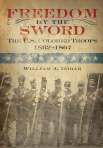 Of the writing and publishing of books about the Civil War, there shall be no end – especially since this year marks the beginning of the sesquicentennial of that most violent and consequential conflict. I’m a bit of a Civil War buff myself and just finished reading Fields of Blood: The Prairie Grove Campaign, which was fought in Arkansas – one of the forgotten fronts of the war. In discussing the subsequent military career of Union General James G. Blunt, it mentioned his victory at Honey Springs in Indian Territory the following year. Now I’ve learned that Honey Springs “marked the first time in the war that black soldiers in regimental strength had carried out a successful offensive operation against Confederate troops.” I’ve also learned that the 54th Massachusetts, made famous by its gallant but unsuccessful attack on Confederate Fort Wagner, as depicted in the film Glory, later steadied Union forces at a crucial juncture of the battle of Olustee – the largest Civil War battle fought inFlorida.
Of the writing and publishing of books about the Civil War, there shall be no end – especially since this year marks the beginning of the sesquicentennial of that most violent and consequential conflict. I’m a bit of a Civil War buff myself and just finished reading Fields of Blood: The Prairie Grove Campaign, which was fought in Arkansas – one of the forgotten fronts of the war. In discussing the subsequent military career of Union General James G. Blunt, it mentioned his victory at Honey Springs in Indian Territory the following year. Now I’ve learned that Honey Springs “marked the first time in the war that black soldiers in regimental strength had carried out a successful offensive operation against Confederate troops.” I’ve also learned that the 54th Massachusetts, made famous by its gallant but unsuccessful attack on Confederate Fort Wagner, as depicted in the film Glory, later steadied Union forces at a crucial juncture of the battle of Olustee – the largest Civil War battle fought inFlorida.How did I learn all of this? By reading a new book that I predict will become a classic – Freedom by the Sword: The U.S. Colored Troops, 1862-1867. I’ve been waiting for this book ever since I learned that the Army’s Center of Military History was working on it. Although the use of black troops by the Union has been studied from many angles, this is the most thorough operational history I’ve seen – in other words, this is a detailed account, by region, of the actual military activities in which these troops engaged. For every heroic charge, these soldiers, like any soldiers in war, spent lots of time patrolling, garrisoning, and guarding. As someone once noted, army life in wartime is made up of long stretches of boredom punctuated by short periods of extreme fear. In addition, poorly managed logistics and spotty (to say the least) medical services created their own special negatives, especially for troops that did not always receive adequate (or any) training. Reading about these gritty details is an excellent corrective to the romantic take on war so prevalent among Civil War soldiers before they “saw the elephant,” a colloquialism of the day for engaging in combat.
Freedom by the Sword also addresses problems unique to black soldiers – the possibility of re-enslavement or massacre if captured. After the notorious slaughter of black soldiers by Nathan Bedford Forrest’s Confederates at Fort Pillow, which soon was recognized by the South as “a propaganda weapon they had handed their opponents,” retaliatory actions and counteractions were succeeded by a mutual realization that such crimes cut both ways. In these cases, fighting for freedom had a steep price, but one that ex-slaves and free blacks alike were prepared to pay.
Freedom by the Sword is an important scholarly resource based on wide-ranging research, as well as a compelling account of men whose real accomplishment, beyond military victory, was “to assert their right to full citizenship and, by extension, that of all their kin.” Serious students of the Civil War will be using this book for many years to come. You can browse through Freedom by the Sword here, get your own copy in either paperback or hardcover, or page through it at a library.
This is available at Hackley Public Library!
Filed under: Center of Military History, U.S. Army




No comments:
Post a Comment